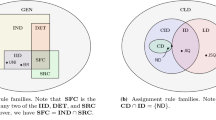Abstract
The theoretical problems of demand-side management are examined in without regard to the type of resource whose demand is to be managed, and the Maximum Demand problem is identified and addressed in a system consisting of independent processes that consume the resource. It is shown that the Maximum Demand problem generalizes the Santa Fe Bar Problem of game theory, and the basic properties of Maintenance and Strong and Weak Recovery that are desirable of systems of processes where demand management is practiced are defined. Basic algorithms are given for solving the Maximum Demand problem in a general context, and in a system where the processes have priorities.
Access this chapter
Tax calculation will be finalised at checkout
Purchases are for personal use only
Preview
Unable to display preview. Download preview PDF.
Similar content being viewed by others
References
Alyfantis, G., Hadjiefthymiades, S., Merakos, L.: An Overlay Smart Spaces System for Load Balancing in Wireless LANs. Mobile Networks and Applications 11(2), 241–251 (2006)
Arthur, W.B.: Inductive reasoning and bounded rationality. American Economic Review 84(2), 406–411 (1994)
Cournot, A.A.: Recherches sur les Principes Mathématiques de la Théorie des Richesses. Calmann-Lévy, Paris (1974); Originally published in (1838), this was re-printed (H. Guitton, ed.) as part of a collection titled Les Fondateurs
Edmonds, B.: Gossip, sexual recombination and the El Farol bar: modelling the emergence of heterogeneity. Journal of Artificial Societies and Social Simulation 2(3) (October 1999)
Enumula, P.K., Rao, S.: The Potluck Problem. Economics Letters 107(1), 10–12 (2010) doi:10.1016/j.econlet.2009.12.011
Goh, C.H.K., Apt, J.: Consumer strategies for controlling electric water heaters under dynamic pricing. Carnegie Mellon Electricity Industry Center Working Paper, CEIC-04-02 (2004), http://www.cmu.edu/electricity
Grebla, H., Cenan, C.: Distributed database replication—a game theory? In: Seventh International Symposium on Symbolic and Numeric Algorithms for Scientific Computing (SYNASC 2005), September 2005, pp. 25–29 (2005)
Greenwald, A.R., Farago, J., Hall, K.: Fair and Efficient Solutions to the Santa Fe Bar Problem. In: Grace Hopper Celebration of Women in Computing (2002)
Greenwald, A.R., Mishra, B., Parikh, R.: The Santa Fe Bar Problem revisited: Theoretical and practical implications (April 1998) (unpublished manuscript)
Hardin, G.J.: The tragedy of the commons. Science 162, 1243–1248 (1968)
Hill, T.T.: Managing scarcity: Changing the paradigm for sustainable resource management. In: Proceedings of the Water Environment Federation, pp. 2659–2665 (2007)
Hines, P., Laio, H., Jia, D., Talukdar, S.: Autonomous agents and cooperation for the control of cascading failures in electric grids. In: 2005 IEEE International Conference on Networking, Sensing and Control, March 2005, pp. 273–278 (2005)
Klein, R., Day, P., Redmayne, S.: Managing Scarcity: Priority Setting and Rationing in the National Health Service (State of Health). Open University Press (1996)
Littlestone, N., Warmuth, M.K.: The weighted majority algorithm. Information and Computation 108(2), 212–261 (1994)
Mazza, P.: Powering Up the Smart Grid: A Northwest Initiative for Job Creation, Energy Security and Clean, Affordable Electricity. Climate Solutions (2005), http://www.climatesolutions.org
Ranganathan, P.: Recipe for efficiency: Principles of power-aware computing. Commun. of the ACM 53(4), 60–67 (2010)
Singh, N., Rao, S.: Modeling and reducing power consumption in large IT systems. In: 4th Annual IEEE International Systems Conference (IEEE SysCon 2010), San Diego, CA (April 2010)
Spees, K., Lave, L.: Demand response and electricity market efficiency. Carnegie Mellon Electricity Industry Center Working Paper CEIC-07-01 (January 2007), http://www.cmu.edu/electricity
Author information
Authors and Affiliations
Editor information
Editors and Affiliations
Rights and permissions
Copyright information
© 2010 Springer-Verlag Berlin Heidelberg
About this chapter
Cite this chapter
Rao, S. (2010). A Foundation of Demand-Side Resource Management in Distributed Systems. In: Gavrilova, M.L., Tan, C.J.K. (eds) Transactions on Computational Science VIII. Lecture Notes in Computer Science, vol 6260. Springer, Berlin, Heidelberg. https://doi.org/10.1007/978-3-642-16236-7_8
Download citation
DOI: https://doi.org/10.1007/978-3-642-16236-7_8
Publisher Name: Springer, Berlin, Heidelberg
Print ISBN: 978-3-642-16235-0
Online ISBN: 978-3-642-16236-7
eBook Packages: Computer ScienceComputer Science (R0)




